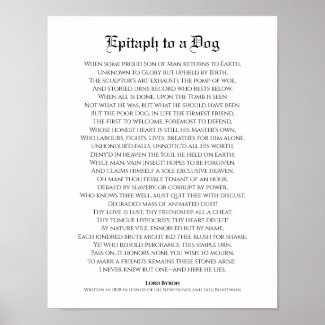8/21/19
Lord Byron's Famous Epitaph to His Beloved Dog Boatswain
The 19th century romantic poet Lord Byron had a great love of animals, especially for his Newfoundland dog named Boatswain. After the dog's passing, Byron created one of his most famous poems Epitaph to a Dog.
Lord Byron, famous for his poetry and infamous for his lifestyle, truly loved animals. In addition to all the dogs, cats and horses he had during his lifetime, Byron owned a bear, monkeys, a fox, a badger, a goat and many types of birds including an eagle, falcon, peacocks and an Egyptian crane. When he was not allowed to have his pet dog Boatswain live with him at Cambridge University, he bought his bear to live with him instead since there was no mention of bears in the statutes.
Boatswain, only five years old, contracted rabies. Despite the chances of being bit and infected with the deadly disease, Lord Byron nursed his dog until he passed in 1808. Although deep in debt at the time, Byron honored his dog with an impressive marble monument and poem:
When some proud Son of Man returns to Earth,
Unknown to Glory but upheld by Birth,
The sculptor's art exhausts the pomp of woe,
And storied urns record who rests below:
When all is done, upon the Tomb is seen
Not what he was, but what he should have been.
But the poor Dog, in life the firmest friend,
The first to welcome, foremost to defend,
Whose honest heart is still his Master's own,
Who labours, fights, lives, breathes for him alone,
Unhonour'd falls, unnotic'd all his worth,
Deny'd in heaven the Soul he held on earth:
While man, vain insect! hopes to be forgiven,
And claims himself a sole exclusive heaven.
Oh man! thou feeble tenant of an hour,
Debas'd by slavery, or corrupt by power,
Who knows thee well, must quit thee with disgust,
Degraded mass of animated dust!
Thy love is lust, thy friendship all a cheat,
Thy tongue hypocrisy, thy heart deceit!
By nature vile, ennobled but by name,
Each kindred brute might bid thee blush for shame.
Ye! who behold perchance this simple urn,
Pass on, it honors none you wish to mourn.
To mark a friend's remains these stones arise;
I never knew but one—and here he lies.
Labels:
companions,
poets

